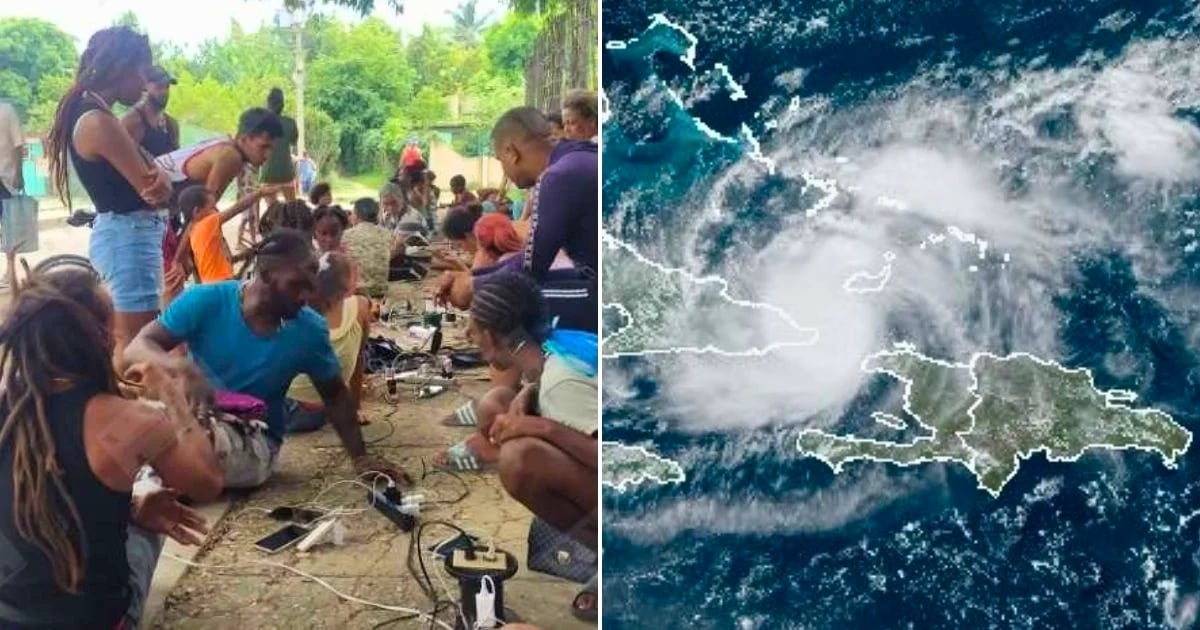
Cuba is facing a critical situation in these last days of October, characterized by a collapse of the national electric system and the impact of Hurricane Oscar in the eastern region. Since October 18, the island has experienced a massive blackout that has affected millions of people, along with the threat and devastating effects of a cyclone that has primarily struck the provinces of Guantánamo and Holguín. Below, we present a recount of the most significant events that occurred up until October 21.
Collapse of the electrical system: "Desperation and pot-banging"
The general blackout in Cuba began on October 18, when the total disconnection of the National Electric System (SEN) left the entire island without electricity. The situation worsened due to the shutdown of the Antonio Guiteras thermal power plant, the main energy generator in the country. This event sparked a series of protests and pot-banging in several locations, such as Old Havana and Reparto Bahía, where citizens expressed their frustration over the lack of electricity supply.
Since then, Cubans have faced a difficult reality of long hours without electricity, which in some cases exceeds 52 hours, such as in Havana, where a resident reported the loss of all their refrigerated food. The outage also affected critical points such as the José Martí International Airport, which generated a scenario of chaos and uncertainty amid the energy crisis.
Impact of Hurricane Oscar: "Blow in the East"
While the country dealt with blackouts, Hurricane Oscar approached the eastern region of Cuba, making landfall on October 20 in the city of Baracoa, Guantánamo province, with sustained winds of 130 km/h. This category 1 cyclone brought intense rains, strong winds, and storm surges that caused flooding in low-lying areas such as the Baracoa waterfront and other coastal areas.
In Maisí, the weather station recorded wind gusts of up to 103 km/h before the arrival of the hurricane, and the Institute of Meteorology of Cuba issued several cyclone warnings, alerting about the possibility of landslides and flooding in vulnerable areas.
Hurricane Oscar occurred in a context of severe energy crisis and logistical limitations, which affected the authorities' ability to carry out evacuations and prevention measures. The critical situation was worsened by the direct impact of the cyclone, which caused severe damage in coastal areas.
Gaviota celebrates a tourism event amidst the electrical crisis.
In a context of blackout and damages caused by the hurricane, the hotel group Gaviota, part of the military conglomerate GAESA, decided to celebrate the sixth edition of the Tourism Fair "Destinos Gaviota 2024" in Holguín. This event has been widely criticized by the population, as it took place amid the most severe energy crisis the country has faced, without sparing resources for its organization. Gaviota prioritized showcasing new tourism developments despite the lack of electricity across the island.
The response of the communist regime
The response of the communist regime of Cuba to this situation has been widely criticized. While citizens face an unprecedented blackout and the impacts of a hurricane, the government has used the justification of the U.S. embargo as the main excuse, thus shifting the responsibility for the lack of investment and mismanagement of the electrical system. Despite the fact that the deterioration of the energy system is a direct consequence of years of inefficient policies and crumbling infrastructure, the authorities have chosen to blame external factors without providing clear or immediate solutions.
The regime's inability to effectively manage the crisis has exacerbated public discontent, reflected in protests, noise demonstrations, and complaints on social media. The lack of electricity is compounded by the disconnection of the internet, which has created informational isolation and difficulties in coordinating effective responses to the emergency. Meanwhile, the leaders have prioritized the restoration of some residential circuits, but the process has been slow, fragmented, and disorganized.
Cubans have openly shown their discontent, demanding deep changes in the management of the country, while facing a critical reality of food insecurity, transportation issues, and inefficient health services, in a context exacerbated by recent disasters.
What do you think?
COMMENTFiled under: